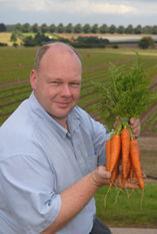
The carrot industry is kept on track by a number of dedicated professionals who have given up their time to ensure that the needs of the humble vegetable are met. These are the guys who work in the fields by day and read research papers by night.
Individuals such as John Kenyon (Huntapac), John Bilsdon (Kettle Produce) and Keith Mawer (Strawson’s) work tirelessly to guide and advise researchers, ensuring that the industry keeps pace with the needs of customers and the recent overbearing changes in legislation that have totally changed the face of crop protection in UK carrot
production. Their achievements in their roles as chairmen of the research and development panel of the British Carrot Growers’ Association have been immense. Vast improvements in carrot quality, year-round availability and an immaculate food safety record are attributable to them. This is against the backdrop of increased customer demands, driven by increasingly demanding consumers, all at a time when a “fresh” land base for carrot production is becoming hard to find and unpredictable, problem-inducing weather patterns are becoming an accepted part of climate change.
As all these demands increase and further consolidation is considered by those in the know to be our inevitable survival model, how are these issues going to be resolved in the future? Where will people gain the knowledge and experience necessary to create the vision and guidance required? The industry is already acutely aware that new blood is an integral component of evolution but equally, the knowledge that historically has been delivered from practical horticultural and agricultural colleges will not be enough to create a dribble, never mind a fountain of knowledge.
But is this all about to change in light of the economic downturn? Will the British public’s perception of production be transformed as has happened in Holland? Opinions there have changed from seeing carrot farming simply as dirty work grappling with the soil to recognising that it is a diamond industry, remaining remarkably and reassuringly stable in these difficult financial times. We hope the British public finally sees the light too and attitudes towards farming become more respectful, making it a more aspirational industry.
An important factor in this process of enlightenment is the work that George Rivers, chairman of the PR committee, does together with agency Mustard Communications. This year alone, they have secured 141 pieces of coverage focusing on the health benefits of carrots and their versatility in cooking as well as features on some of the UK’s carrot farmers. The PR team is also there to deal with any misconceptions in the media, which are mercifully few due to the hard work they have put in over the years.-



